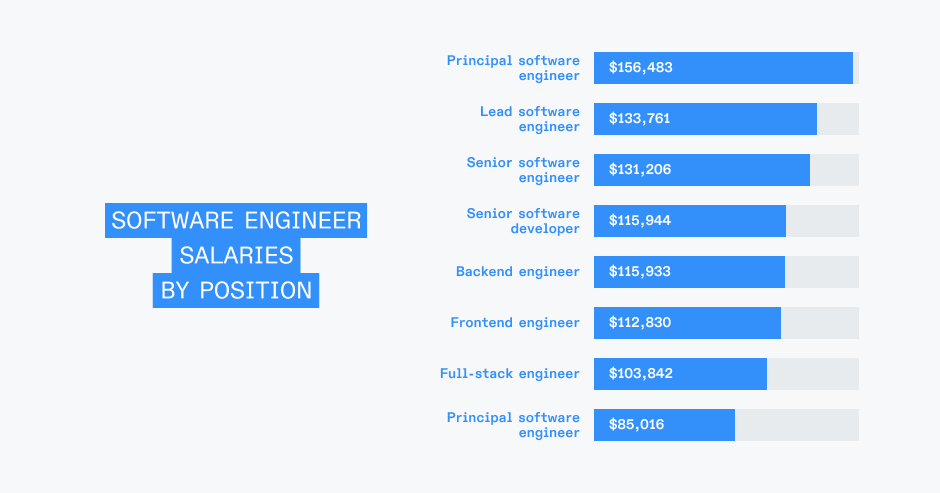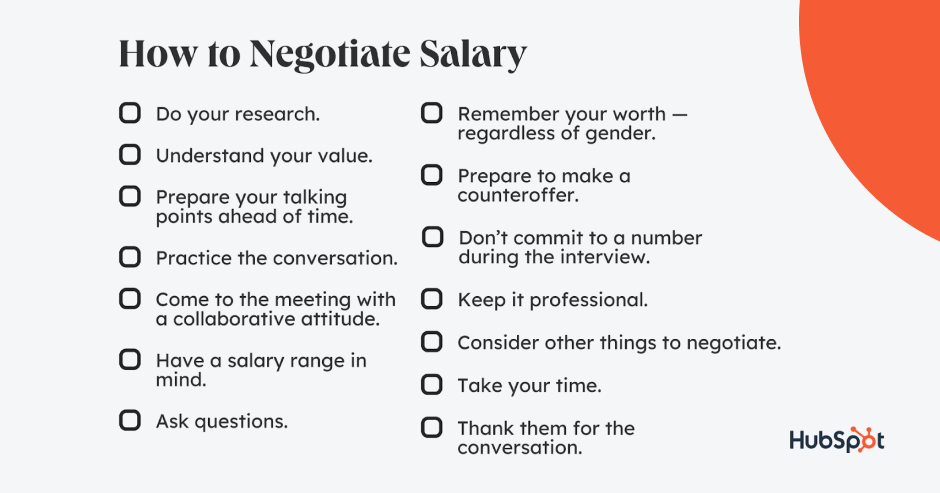As a software engineer, it's essential to know your worth in the job market. Software Engineers typically earn an average salary of about $117,978 according to Indeed, yet this number only reveals part of the story.

Knowing how to negotiate might land you even more, despite the six-figure milestone being worth celebrating. However, beyond just money, additional benefits can often hold greater value. In this blog, we'll explore the key factors influencing software engineering manager salaries and provide practical tips for successful salary negotiations.
Also read: 10 programming languages that will land you a salary of $100k in the US
Software Engineer Salary: What to Expect
When considering a career as a software engineer, it's essential to understand the factors that influence salary expectations. By being well-informed about industry standards and market trends, you can better prepare for successful salary negotiations.
Several factors can influence software engineering manager salaries, including geographic location, company size, industry, and experience level. Typically, professionals working in major tech hubs or large companies can expect higher salaries. Similarly, certain industries, such as finance or technology, may offer more competitive compensation packages.
On average, the annual salary of software engineers in the world can range between 50k-100k. In addition to base salary, software engineers may also receive bonuses, stock options, and other benefits, further impacting their overall compensation.
In-Demand Programming Languages and Their Impact on Salary Potential
Proficiency in in-demand programming languages can significantly impact a software developer's salary potential. Some of the most commonly used programming languages in 2023 include JavaScript, SQL, Python, C++ and Java. Mastery of these languages can lead to higher-paying job opportunities and increased bargaining power during salary negotiations.
Additionally, expertise in other high-paying programming languages, such as Ruby, Rust, Swift, and Kotlin, can further enhance a software developer's earning potential. By staying up-to-date on the latest programming languages and market trends, software engineers can position themselves for success in salary negotiations and long-term career growth.
Armed with this knowledge, engineers can confidently enter salary negotiations, advocating for fair compensation that reflects their skills, experience, and market value. By doing so, they can maximize their earning potential and secure a rewarding career in the ever-evolving field of software engineering.
Also read: 12 most in-demand programming languages to learn in 2023

Preparing for Salary Negotiation
Before entering salary negotiations, it's crucial to be well-prepared and knowledgeable about the various components of a job offer. A comprehensive job offer typically includes a base salary, performance bonuses, equity packages, sign-on bonuses, and a range of benefits and perks. Understanding the value of each component can help you better assess the overall attractiveness of a job offer and identify areas for negotiation.
Researching industry salary standards and compensation ranges is a vital step in preparing for salary negotiations. Resources such as the Payscale Report and The Salary Negotiator can provide valuable insights into the current market rates for software engineering talent. By familiarizing yourself with these figures, you can establish a realistic and well-informed salary expectation, which is an essential foundation for successful negotiations.
In addition to industry research, it's crucial to evaluate your own personal factors that may affect your negotiation power. Your experience and skill set will play a significant role in determining your worth in the job market. Additionally, your current salary and job satisfaction can impact your willingness to accept or negotiate a new offer. Finally, if you have competing job offers, this can strengthen your bargaining position and provide leverage during negotiations.
Taking the time to thoroughly prepare for salary negotiations by understanding the various components of a job offer, researching industry standards, and evaluating your own personal factors will put you in the best position to negotiate effectively and secure a software engineer salary that reflects your true market value.

How to Negotiate a Software Engineer Salary
Entering salary negotiations as a software engineers requires careful preparation and strategy. It's essential to approach the negotiation process with a clear understanding of industry standards, market trends, and the value of your skills and experience. By following these tips and avoiding common mistakes, you can maximize your earning potential and secure a rewarding career in software engineering.
Tips for Successful Negotiation
Before entering negotiations, it's crucial to do your homework by researching market rates and industry standards for software engineering manager salaries. This research will help you establish a realistic salary expectation and provide a solid foundation for negotiation.
Create your priority list
Begin by outlining your absolute necessities and a few additional desires that could be classified as "nice-to-haves." For most Software Engineers, essentials include:
Annual income covering:
- Rent or Mortgage
- Food expenses
- Clothing
- Transportation costs
- Vehicle and home insurance
- Device and home network insurance
- Basic utilities
- High-speed internet
- Childcare expenses
- Gifts for family and friends
- Vacation budget
- Health and dental insurance
This list generally meets most engineers' fundamental needs. Additionally, consider these "nice-to-haves":
- Paid time off
- Flexible work hours
- Remote work options
- Student loan support
- Childcare benefits
- Parental leave
- Reimbursement for training courses
- Stock options
- Bonus structures
Assess your flexibility
Employers typically offer a mix of items from both your necessity and luxury lists. Some benefits, like paid time off or remote work, might be standard. Consider in advance where you're willing to compromise:
For instance, would you accept:
- Remote work with slightly lower pay?
- Student loan aid instead of stock options?
- Stock options with a reduced salary?
- Flexible hours instead of additional paid time off?
Map these preferences out before negotiating. Bringing a clear, organized list to discussions demonstrates your clarity and determination in what you seek.
Allow employer to lead discussion on salary figures
Allow the employer to lead the discussion on salary figures, as this can provide valuable insight into their budget and expectations. Focus on what the company wants and demonstrate how your skills and experience align with their needs. This approach can help you establish a strong connection between your value and the salary you're requesting.
Advocate for yourself by confidently presenting your qualifications and work ethics, but also be prepared to listen and adapt to the employer's perspective. Practicing your negotiation beforehand can help you refine your approach and increase your confidence during the actual negotiation process.
Common Negotiation Mistakes to Avoid
Most people feel nervous discussing money. Avoid sharing your salary expectations too early in the process, as this can limit your negotiation power. Instead, focus on understanding the job requirements and the employer's expectations before discussing compensation.
Don't be afraid to negotiate, as many employers expect candidates to advocate for themselves during salary discussions. By entering negotiations with confidence and a well-prepared strategy, you can increase your chances of securing a fair and competitive salary.
Finally, ensure you've conducted thorough research to set realistic expectations for your software engineer salary. Failing to do so can result in disappointment or an unsuccessful negotiation process.
By following these tips and avoiding common mistakes, you can effectively negotiate a software engineering manager salary that reflects your skills, experience, and market value, ultimately securing a rewarding and fulfilling career.
How Index Can Support Your Career Growth and Salary Potential
By leveraging the benefits of remote work through Index.dev, software developers can unlock new career opportunities and increase their earning potential. By accessing first-class US, UK & EU jobs, embracing flexible arrangements, and streamlining payments and compliance processes, you can land even six figures salaries by working on interesting projects.
Index.dev is a global remote work platform offering long-term, full-time opportunities for developers, boasting an impressive 95% talent retention rate. We prioritize security, reliability, and high-quality services for software engineers, ensuring fair and consistent pay without the common freelancer concerns like client ghosting or payment fraud.
Advantages of working with Index.dev:
Remote Work: Work from anywhere, breaking location barriers.
Long-Term Full-time Work: Contracts run for a minimum of 12 months, catering to your long-term work needs.
Competitive Rates: Get paid on time without the need to bid for jobs or undercut rates.
Top Clients: Work for reputable companies from the US, Canada, UK, and Europe, pre-qualified for budget, culture, and size.
Time Efficiency: Skip job searches and interviews; we connect you to ready-to-hire clients.
Trusted: Start with a trusted platform, bypassing the need to build your reputation from scratch.
As you negotiate your salary and seek new opportunities, consider the advantages of remote work and the support that Index.dev can provide. By doing so, you can maximize your earning potential and secure a rewarding career as a software engineering manager.
Conclusion
Knowing your worth and negotiating effectively are essential factors in securing a rewarding career as a software engineer. A successful negotiation can have a lasting impact on your long-term career growth and satisfaction, ensuring that your compensation reflects your skills, experience, and market value.
As the software engineering landscape continues to evolve, exploring remote opportunities with platforms like Index.dev can provide additional avenues for maximizing your salary potential. By leveraging the benefits of remote work, you can elevate your career and secure a fulfilling and lucrative position in the competitive world of software engineering management.
In summary, it's crucial to stay informed about industry standards, market trends, and the value of in-demand programming languages. By doing so, you can enter salary negotiations with confidence and secure a software engineer salary that reflects your true market value.